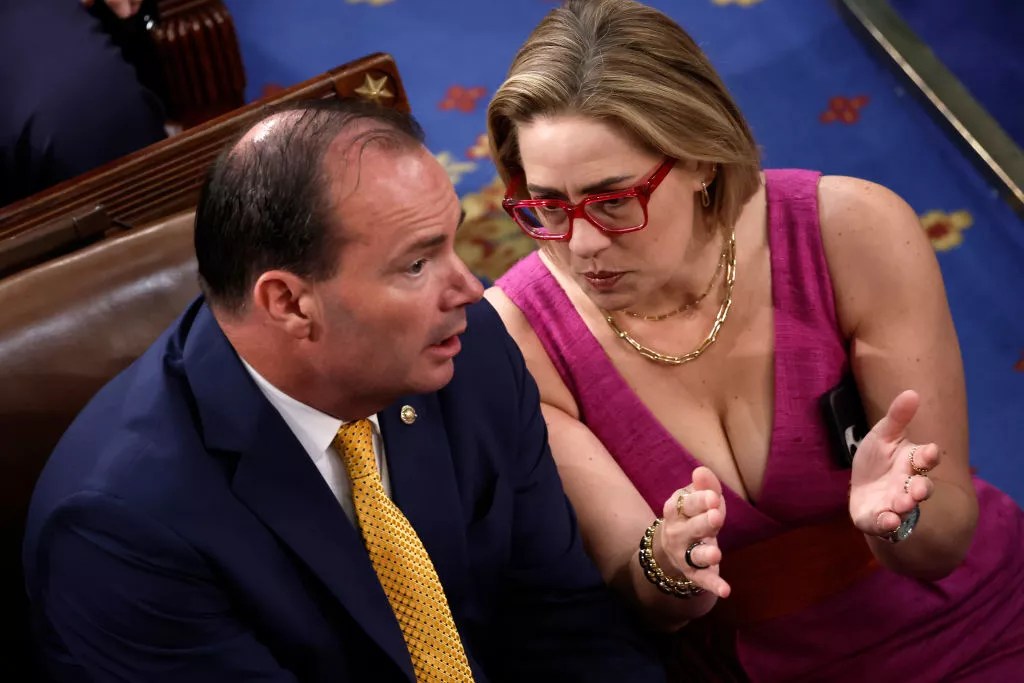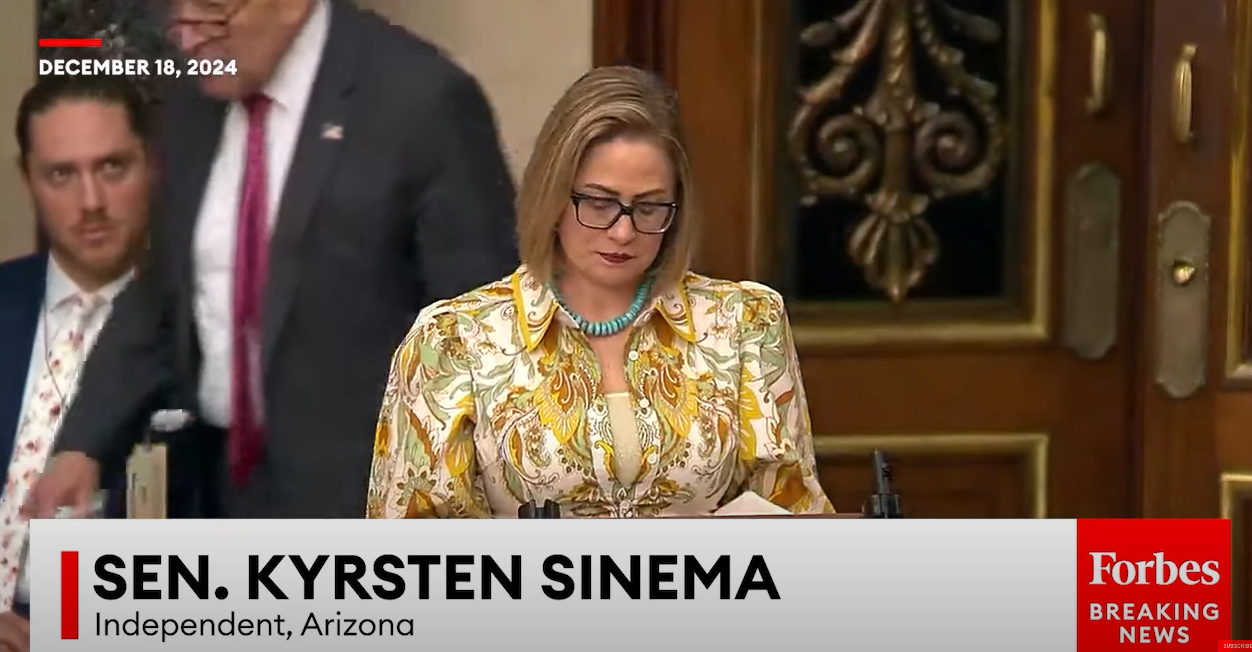
Gage Skidmore/Flickr/CC BY-SA 2.0

Audio By Carbonatix
Sen. Kyrsten Sinema, who entered the U.S. Senate as the first Democrat to represent Arizona in 24 years, is leaving it after becoming profoundly unpopular. Once a champion of the left, she is now resented by many Democrats for abandoning the party to become an Independent and for consistently voting against working-class interests, all while spending campaign cash on a luxurious jet-setting lifestyle.
But in her farewell address on the floor of the Senate on Wednesday, Sinema didn’t mention any of that. Instead, she called for cross-aisle negotiating and bipartisan dealmaking in an increasingly partisan era of American politics, touting her work with GOP senators.
“Over the past six years, I’ve had the honor of serving with lawmakers on both sides of the aisle who chose to do the hard work and who took the time to build relationships and build that consensus,” Sinema said. “Together, we accomplished real results for the constituents we serve across this great country. And I am so grateful for the colleagues who took those risks with me.”
Here’s a breakdown of what Sinema said – and what she didn’t – in her final senatorial speech.
What she said: God, I love the filibuster
It is undeniable that Sinema was a rare bipartisan force in the Senate and at the center of many of the most important deals struck in the Chamber since 2019. She had a hand in the CHIPS and Science Act that boosted funding for U.S. chipmakers; the Infrastructure Investment and Jobs Act that made huge, overdue investments across the country; the Bipartisan Safer Communities Act that aimed to prevent tragic mass shootings; and a bipartisan border bill that was blocked by Republicans on the orders of Donald Trump.
According to Sinema, those deals and other key legislation were made possible by her and her colleagues “listening to each other – not to debate or rebut but to understand.”
She said, “I can’t think of anything more dangerous to our dear democracy than the unwillingness to question our own preconceived ideas, to examine our own biases or to learn from those who think differently from ourselves. What I’ve tried to demonstrate in these six years is you don’t have to burn down the rules and the norms to achieve what you want. You can just do the hard work.”
Sinema praised the U.S. system of checks and balances, the two-party system and the Senate filibuster, which she publicly defended even as many Democrats hoped to eliminate it during Joe Biden’s presidency. Defending the filibuster, which requires a supermajority of 60 votes to overcome, became a defining act for the senator.
“When holding political power and feeling the hunger and pressure for an immediate partisan win, it is easy to view the legislative filibuster as a weapon of obstruction,” Sinema said. “It is tempting to prefer elimination of the filibuster to compromise. It certainly feels faster, easier and more satisfying – at least in the short term, that is. But there are dangers to choosing short-term victories over the hard, necessary work of building consensus.”
As an example, she lamented the fact that since 2013, judicial nominees have needed only a simple majority from the Senate to be appointed. Democrats eliminated the filibuster in those cases to get around Republican obstructionism during Barack Obama’s second term. Republicans later eliminated it for Supreme Court nominees.
“No longer is the majority party required to nominate mainstream judges who earn support from across the political spectrum,” Sinema said, though Obama’s nominees were hardly out of the mainstream. “Now it’s just a race to get your guys into the spots while you have power. And yet, some wonder why public trust in our judiciary is at an all-time low.”
Sinema also said of the partisan confirmations that “while one political party started it, the other finished it,” effectively blaming the change on both parties when Republicans were primarily responsible. Democrats only eliminated it in 2013 because Republicans had begun filibustering nearly every lower-court nominee.
What she didn’t say: My base hates me
Sinema talked a lot about her wins – but not nearly as much about the things she did that pissed off many members of her base. As Sinema sought to make her name as a bipartisan-minded maverick like past Arizona senators and become a powerful dealmaker, she also insulated herself from her constituents with her devil-may-care attitude about their opinions.
The first glaring example of her disconnect from the people came in January 2021 when she voted against an increase in the federal minimum wage, hurting working people while registering her clinching vote with a flippant curtsy. The moment went viral – and not because people loved it.
Over time, Sinema’s sumptuous lifestyle, paid for with campaign contributions, came to light. An investigation by the Howard Center for Investigative Journalism at Arizona State University found in May 2023 that a Sinema-sponsored political action committee shelled out big-time money for “private air charters, first-class flights for lobbyists, five-star hotels in Paris and Madrid, and tens of thousands of dollars on catered wine.”
She also earned a reputation as a friend and ally to the ultrawealthy. While she was a key swing vote during the first two years of Joe Biden’s presidency, she made a deal to keep a key tax loophole alive for private equity firms and hedge funds – the wealthiest of the wealthy. After that, such companies donated at least $526,000 to her campaign.
In 2023, she was a top recipient of donations from the student loan, airline and credit union industries, according to OpenSecrets, a nonprofit that tracks campaign finances.

Staunch MAGA Republican Sen. Mike Lee of Utah was one of a dozen GOP senators Kyrsten Sinema shouted out during her farewell address.
Anna Moneymaker/Getty Images
What she said: Check out my GOP pals
In touting her own bipartisan work in the Senate, Sinema gave shoutouts to a dozen of her Republican colleagues, including moderates such as Rob Portman of Ohio and Susan Collins of Maine and more conservative figures such as Mike Lee of Utah and Roger Wicker of Mississippi. She worked with several on key bipartisan legislation: John Cornyn of Texas on gun violence reform, James Lankford of Oklahoma on this year’s border funding bill and Bill Cassidy of Louisiana on the infrastructure bill.
Tellingly, Sinema named more Republicans than Democrats. She mentioned eight Democrats plus Joe Manchin, who like Sinema is a Democrat turned Independent. Comically, she gave a shoutout to Sens. Patty Murray of Washington, Brian Schatz of Hawaii and Chris Murphy of Connecticut before adding, “I hope I haven’t ruined your careers.”
What she didn’t say: Screw you, Democrats
With her political support evaporated, Sinema announced in March 2024 that she would not run for reelection after falling behind in fundraising to Democrat Ruben Gallego, who will take Sinema’s seat in January. But even after she publicly backed away from running, her campaign spent more than $100,000 on trips and meals.
But for all her dedication to bipartisanship, Sinema couldn’t resist tanking a vote for her former party when there was no need to reach across the aisle. In her final act, Sinema scuttled Democrats’ plans to reappoint a pro-union member of the National Labor Relations Board. The nomination failed by one vote.
Perhaps not coincidentally, Senate Majority Leader Chuck Schumer, a New York Democrat, missed much of Sinema’s final speech. He walked into the chamber just as she was wrapping up:

Screenshot via YouTube